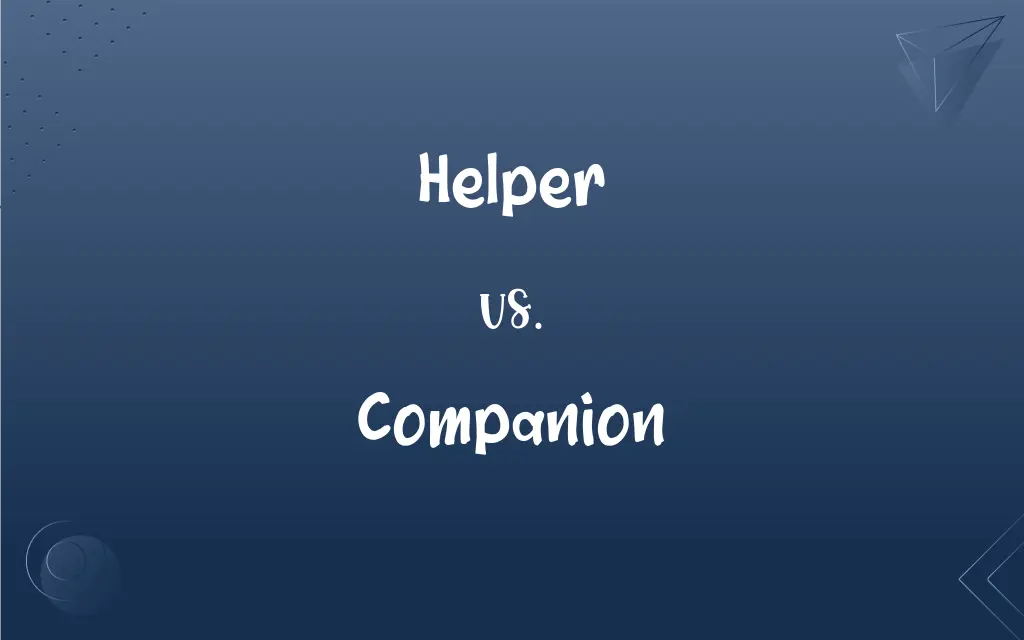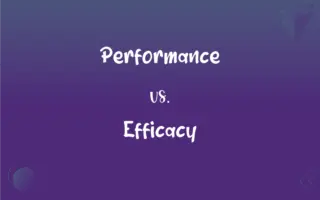Helper vs. Companion: What's the Difference?
Edited by Harlon Moss || By Janet White || Updated on October 5, 2023
A helper assists with tasks or needs, while a companion provides company and fellowship without necessarily assisting in tasks.

Key Differences
In the realm of aid and support, a helper is fundamentally seen as one who provides assistance, often in the form of completing tasks or facilitating certain actions. A companion, however, exudes a quality of fellowship, providing emotional or social support and company, not specifically tied to the act of providing help or facilitating tasks. A helper may be skilled in particular tasks while a companion may be valued for their presence and emotional support.
It's notable that the term "helper" often derives its use from a functional standpoint, describing an individual or entity designed to assist in specific tasks or challenges. In contrast, "companion" encapsulates a broader, more emotionally resonant role, which may involve being present, offering friendship, or simply sharing in experiences, without the tangible act of helping in a practical sense. The functionality is the key for a helper while emotional availability is central to a companion.
While a helper generally focuses on providing assistance, solving problems, or facilitating ease in practical tasks, a companion might be more inherently involved in sharing time, experiences, and social interaction. Thus, the helper is typically involved in a more practical, task-oriented manner, whereas the companion exists in a social, emotionally supportive capacity, not specifically bound by the necessity to assist or facilitate actions in a tangible way.
A helper may be transactional, with their value often derived from their ability to facilitate actions or solve problems. In juxtaposition, a companion provides value in the emotional realm, offering support, camaraderie, and company, which may or may not include practical assistance. So, a helper could be impersonal and task-focused while a companion may not provide any tangible help but is there for emotional and social interaction.
Although the role of a helper is usually tied to practical assistance, a companion’s role typically revolves around social or emotional presence. A helper might not engage on an emotional level, their utility lies in their ability to assist, while a companion might not assist in tasks but provides social and emotional engagement, offering a mutually beneficial relationship that isn’t necessarily rooted in practical task completion or problem-solving.
ADVERTISEMENT
Comparison Chart
Primary Role
Assistance in tasks
Providing company
Emotional Aspect
May not be involved
Often involved
Functional Role
Task-oriented
Social/emotional
Necessity
Practical need
Emotional/social need
Relation
Can be impersonal
Often personal
ADVERTISEMENT
Helper and Companion Definitions
Helper
A tool or application designed to provide assistance.
The software helper made data entry easier.
Companion
Someone who accompanies others.
She was a companion on his travels.
Helper
One who assists others in performing tasks.
The teacher’s helper distributed the materials.
Companion
A person sharing experiences or activities.
Her companion shared stories around the campfire.
Helper
Someone who aids in accomplishing a goal.
She was a great helper during the fundraiser.
Companion
An entity providing emotional or social support.
The therapy animal was a calming companion.
Helper
A person who provides support in specific tasks.
The helper carried the packages upstairs.
Companion
One who spends time with others.
He enjoyed being a companion to the elderly lady.
Helper
To give assistance to (someone); make it easier for (someone) to do something; aid
She helped me with my project. I helped her find her book.
Companion
A person who accompanies or associates with another; a comrade.
Helper
To give material or financial aid to
Help the homeless.
Companion
A domestic partner.
Helper
To wait on, as in a store or restaurant
Please help the customer in aisle 20.
Companion
A person employed to assist, live with, or travel with another.
Helper
To contribute to the effectiveness or improvement of (something); improve or advance
Tax breaks to help create jobs.
New ways to help the environment.
A remark that didn't help the situation.
Companion
One of a pair or set of things; a mate.
Helper
To ease the pain or discomfort of; relieve
Medication to help your cold.
Companion
A companionway.
Helper
To refrain from; avoid or resist. Used with can or cannot
Couldn't help laughing.
Companion
To be a companion to; accompany.
Helper
To be of service; give assistance
I made a cake, and my friend helped.
Companion
A friend, acquaintance, or partner; someone with whom one spends time or accompanies
His dog has been his trusted companion for the last five years.
Helper
To be of use or provide relief
He has a bad back, and physical therapy hasn't helped.
Companion
(dated) A person employed to accompany or travel with another.
Helper
The action of helping; assistance
Do you need help with that package?.
Companion
(nautical) The framework on the quarterdeck of a sailing ship through which daylight entered the cabins below.
Helper
One that helps
You've been a great help. A food processor is a help to the serious cook.
Companion
(nautical) The covering of a hatchway on an upper deck which leads to the companionway; the stairs themselves.
Helper
(Archaic) A person employed to help, especially a farm worker or domestic servant.
Companion
(topology) A knot in whose neighborhood another, specified knot meets every meridian disk.
Helper
Such employees considered as a group. Often used with the.
Companion
(figuratively) A thing or phenomenon that is closely associated with another thing, phenomenon, or person.
Helper
One who helps; an aide; assistant; auxiliary.
Companion
(attributive) An appended source of media or information, designed to be used in conjunction with and to enhance the main material.
The companion guide gives an in-depth analysis of this particular translation.
Helper
That which helps; anything serving to assist.
Companion
(astronomy) A celestial object that is associated with another.
Helper
A person who does cleaning and cooking in a family home, or in a market; domestic employee.
Companion
A knight of the lowest rank in certain orders.
A companion of the Bath
Helper
A locomotive that assists a train, usually on steep gradients.
Companion
A fellow; a rogue.
Helper
One who, or that which, helps, aids, assists, or relieves; as, a lay helper in a parish.
Thou art the helper of the fatherless.
Compassion . . . oftentimes a helper of evils.
Companion
(obsolete) To be a companion to; to attend on; to accompany.
Helper
A person who contributes to the fulfillment of a need or furtherance of an effort or purpose;
My invaluable assistant
They hired additional help to finish the work
Companion
(obsolete) To qualify as a companion; to make equal.
Helper
A person who helps people or institutions (especially with financial help)
Companion
One who accompanies or is in company with another for a longer or shorter period, either from choice or casually; one who is much in the company of, or is associated with, another or others; an associate; a comrade; a consort; a partner.
The companions of his fall.
The companion of fools shall smart for it.
Here are your sons again; and I must loseTwo of the sweetest companions in the world.
A companion is one with whom we share our bread; a messmate.
Helper
An entity that facilitates ease in actions.
The helper robot performed the repetitive tasks.
Companion
A knight of the lowest rank in certain orders; as, a companion of the Bath.
Companion
A fellow; - in contempt.
Companion
A skylight on an upper deck with frames and sashes of various shapes, to admit light to a cabin or lower deck.
Companion
To be a companion to; to attend on; to accompany.
Companion
To qualify as a companion; to make equal.
Companion me with my mistress.
Companion
A person who is frequently in the company of another;
Drinking companions
Comrades in arms
Companion
A traveler who accompanies you
Companion
One paid to accompany or assist or live with another
Companion
Be a companion to somebody
Companion
An individual who shares company or fellowship.
His dog was his constant companion.
FAQs
Can a helper be non-human?
Yes, a helper can be a tool, software, or animal assisting in tasks.
Can a helper act independently?
Yes, a helper can take initiatives within the context of assisting.
Is a helper always physically present?
No, virtual assistants or online tools are helpers without physical presence.
Does “helper” imply subordination?
Not necessarily, it indicates assistance but not always a lower status or role.
Is a companion always friendly?
Typically yes, but context may imply various nuances to the relationship.
Can objects be referred to as companions?
Yes, if they provide some form of consistent company or comfort.
Do both words always refer to beings?
No, both words can refer to inanimate objects depending on the context.
Do all helpers provide emotional support?
Not necessarily, helpers may provide only practical or task-related support.
Is a companion always intentional?
No, one can be a companion merely by being present, regardless of intent.
Is every assistant a helper?
Generally yes, if they assist or facilitate tasks, they can be considered a helper.
Is companionship always positive?
Generally, but it could be neutral or negative depending on shared experiences.
Can “helper” and “companion” be used interchangeably?
Not always, as “helper” emphasizes assistance, and “companion” emphasizes company.
Can a negative connotation be implied with “companion”?
Rarely, but possible if the context, like negative shared experiences, implies it.
Can “companion” imply a romantic relationship?
It can, depending on context, but it doesn't inherently imply romance.
Can one person be both a helper and a companion?
Yes, someone can both assist with tasks and offer companionship.
Is a companion always supportive?
Not necessarily, they provide company but not always support.
Is a helper always beneficial?
Generally yes, but the effectiveness can depend on the context and perspective.
Does a helper always imply a transactional relationship?
Not always, help can be provided without expectations.
Can a helper engage in a purely digital or virtual manner?
Yes, digital tools or virtual assistants are examples of such helpers.
Can companionship exist without interaction?
Yes, simply being present can be considered companionship.
About Author
Written by
Janet WhiteJanet White has been an esteemed writer and blogger for Difference Wiki. Holding a Master's degree in Science and Medical Journalism from the prestigious Boston University, she has consistently demonstrated her expertise and passion for her field. When she's not immersed in her work, Janet relishes her time exercising, delving into a good book, and cherishing moments with friends and family.
Edited by
Harlon MossHarlon is a seasoned quality moderator and accomplished content writer for Difference Wiki. An alumnus of the prestigious University of California, he earned his degree in Computer Science. Leveraging his academic background, Harlon brings a meticulous and informed perspective to his work, ensuring content accuracy and excellence.































































